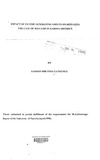| dc.description.abstract | The study focuses on the impacts of the income generating groups owned and run by refugees. Using the case of income generating groups in Ifo refugee camp, Kenya, it examines the viability of the groups, factors affecting group's performance and sustainability and those influencing their members participatory levels. More specifically, the dissertation focuses on the role played by these groups in helping refugees to adjust to
a challenging new environment by engaging them in socio-economic activities that help them to be self reliant.
The study is based on a survey and the ethnographic data of 89 members of income generating groups in Ifo refugee camp, Garissa district. Direct observation of the groups' activities and interviewing of the key respondents was also undertaken. Both the descriptive and inferential statistics were used in the data analysis.
This study has several findings related to policy reforms in dealing with the refugees. For example, the study found that the amount of income earned from the income generating groups does not discourage refugees from repatriation to their country. This study confirms that even refugees who received high income from their group membership still express their willingness to be repatriated when the situation improves in their country.
Further, the study reveals that despite the controversial arguments on the net effects of external assistance to refugees' groups, it's availability is not a significant determinant of
the income generated and distributed by the refugees' groups. Importantly, the nature of~~~
the group's activity emerged as a significant factor boosting the gains received by the members. In general, the findings of this study suggests that if high-income-generating activities were emphasized, the refugees' groups studied could successfully improve their members ability to reduce dependence on hand-outs and alleviate the problem of idleness.
At another level, it emerged that most of the members of income generating groups were women refugees. In total. women refugees made up 92.5% of the total membership of the groups studied. This could probably be explained by the fact that they were the majority adult members in the camp. Again. the fact that 89% of the 29 active groups engaged in weaving oriented activities could have contributed greatly to this finding for traditionally. this activity has been dominated by women. This finding suggests that if the group activities were diversified their performance and sustainability levels could be enhanced a great deal.
Based on the study's findings. it is recommended that more male participation In the group affairs should be encouraged. This is because the study established that out (If the total 466 group members in Ifo Camp, there were only 35(7.5%) men members. The study therefore, recommends the conducting of research programs on the activities- that suits them most. Further. more capital should be invested in these groups in form uf the financial and material resources. In general, however. since both males and females engages in different activities. their groups should not be treated as substitutes | en |

